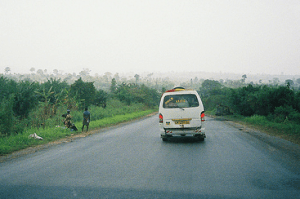Five years after treaty on the Abidjan-Lagos Corridor Highway Project
 It was with much fanfare in March 2014, that the Presidents of Côte d’Ivoire, Ghana, Togo, Benin and Nigeria, signed a treaty on the establishment of the six lane Abidjan-Lagos corridor highway project.
It was with much fanfare in March 2014, that the Presidents of Côte d’Ivoire, Ghana, Togo, Benin and Nigeria, signed a treaty on the establishment of the six lane Abidjan-Lagos corridor highway project.
It was celebrated because it was expected to herald remarkable socio-economic development for these five countries on the corridor and the ripple effects across the closely linked West African region.
The multinational highway from Abidjan in Cote d’Ivoire runs through Ghana, Benin, and Togo to Lagos in Nigeria and is part of the trans-African highway connecting some of the major cities and economic centers on the continent.
It also links the major seaports in the region which serve landlocked countries such as Burkina Faso, Mali and Niger.
Developing this 1009-kilometer road was therefore expected to be a catalyst for enhancing the huge economic potential in the region.
The importance of the project to the continent is underscored by the fact that it is listed as one of the priority continental infrastructure projects identified as Programme for Infrastructure Development in Africa (PIDA) projects.
From the Abidjan end, there has been good news on the progress the project has recorded but from the Nigerian end starting from Lagos this critical infrastructure project has largely been in limbo.
Two recent events may however turn things around.
The first is the signing of a $22.7 million “grant retrocession agreement” between the Economic Community of West African States (ECOWAS) and the African Development Bank this year.
This is to finance all the technical studies for the implementation, operations and economic development of the dual carriage highway.
Specifically, the two-year project is for Feasibility, Environmental and Social Impact Assessment as well as detailed Engineering Design and preparation of tender documents for the Abidjan-Lagos Corridor Highway Development Project.
The European Union from its African Investment Facility (AfIF) mobilized € 9.13 million while the African Development Bank contributed approximately $11.06 million (Grants and Loans).
This is a pre-project activity. The second event which also took place at the Ecowas Commission in Abuja placed the project in the hands of managers to give it more traction.
ECOWAS launched a Project Implementation Unit to oversee the day-to-day management of the Highway Project under the supervision of the Commissioner for Infrastructure at the ECOWAS Commission, Mr Pathe Gueye who oversights the project through the Project Manager.
Mr Gueye re-stated that the Abidjan-Lagos Corridor Project remains a priority to the ECOWAS Commission, Ecowas member states on the corridor as well as Development Partners considering the immense benefits that will accrue to the region from its implementation.
Governments at the National and sub-national level in Nigeria have also started showing more than passing interest in getting some work done on the project.
Their hands are also being forced by the people who have shown some discontent at the scandalous state of the Nigerian end of the road running from Lagos to Badagry which is not only a super highway but is the major gateway into the country.
The Abidjan-Lagos project when fully implemented is expected to enhance the Ecowas free movement protocol, integrate the economies of countries in the region and promote cross-border trade in the West African region which has been estimated at just 11 per cent in spite of intense efforts over the years to implement the Ecowas Trade Liberalization Scheme [ETLS].
The Borderless Alliance group in a recent report indicated that at the moment, West Africa is the least integrated region in the World in terms of cross border trade.
A Senior Director at the African Development Bank, AfDB, Ebrima Faal, corroborated this when he recently stated that “In West Africa, intra-regional trade of just around 11 per cent does not reflect the immense potential for the region.”
Faal said boosting regional trade will require far greater investment in cross border infrastructure; especially transport links, power and transmission, and ICT”.
This is what makes the Abidjan-Lagos Corridor highway a strategic project as the investment in the six-lane super highway by Continental institutions, donor partners and the respective governments will directly impact on the economies of Nigeria, Benin republic, Togo, Ghana and Cote d’Ivoire as well as other countries in the region with a growing population of over 393 million people.
The Abidjan-Lagos highway is one of the 400 hundred continental priority projects under the PIDA.
By Wilfred Ewaleifoh
